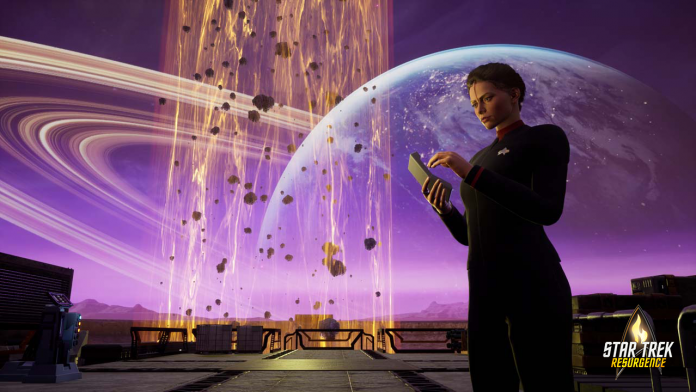Note: A Press Build of the game was provided to us by the developer.
Star Trek is my secret personal passion. I’ve never been a Trekkie, but growing up as a kid of the mid 80s and then 90s, Star Trek and Next Generation became foundational for me and the media that I loved. While Star Wars had some more of the fantastical elements to it that I enjoyed, Next Generation captured my attention for the way in which it told so many varied stories that often revolved around solving problems through violence as a last resort and presented a vision of a future in which conflict, while unavoidable, was not insurmountable, and in which the prevailing concept of the universe was one of tenacious progress and hope.
This is perhaps a controversial opinion, but I have spent much of the last 20 years or so watching Star Trek just sort of bumble about as a franchise. The newer movies had vibrancy and life but seemed doomed to go nowhere, and most attempts at modernizing the series on television were met with abysmal failures of the initial idea and concept. Star Trek was never about the combat or the action, but was about the dramatics and the storytelling, exploring a high concept future of hope, and I’ve felt slightly frustrated in how distant that type of storytelling seems to have become.
Games based on Star Trek similarly seemed to always just come up short of actually capturing the ideology and mindset of the series, focusing too much on action gaming than the narrative that makes Star Trek so appealing. Star Trek Resurgence by Dramatic Labs tries to deliver on producing Star Trek’s unique vision of the future in a narrative adventure game shell, and manages to encapsulate everything good–and bad–about Star Trek, along with some quibbles of the long shadow left behind by Telltale games.
Tapestry
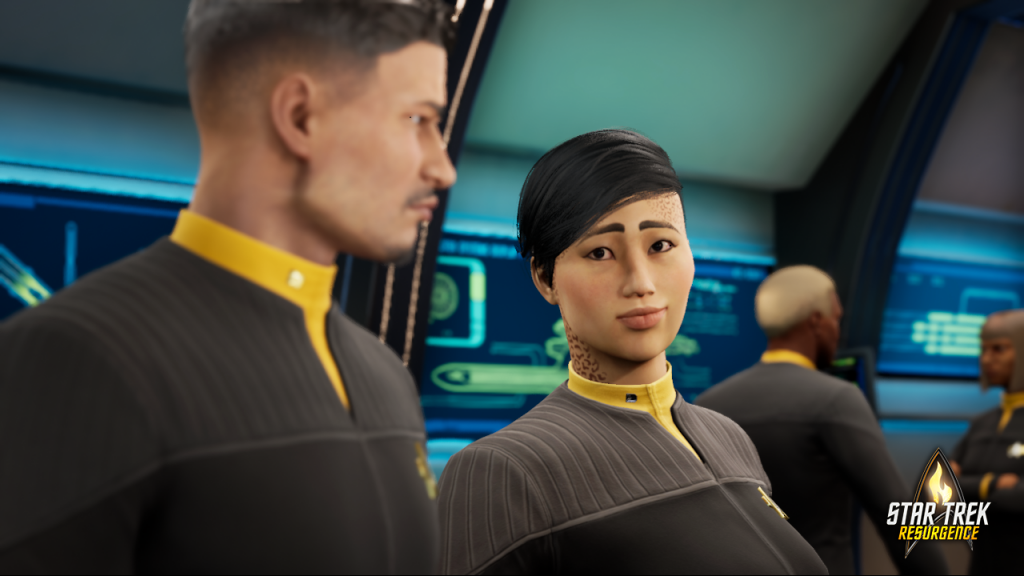
Resurgence starts by introducing players to Jara Rydek, a half-Kobliad Commander in Starfleet with a particularly nebulous but apparently amazing record of service that brings her a lot of respect and notoriety. If you don’t know what a Kobliad is, don’t worry too much about turning in your tricorder; they’re not a particularly famous race in Star Trek, and notably have a genetic defect that requires use of a substance known as Deuridium to stabilize their cell-structure; this becomes both plot relevant in a few ways, and also a means to provide the seemingly superheroic Rydek with a slice of foretold weakness. After a bit of tutorial introduction and scene-setting, the game then introduces the secondary protagonist, Petty Officer Carter Diaz, a member of the long-suffering “lower decks”: the grunts who do all of the work below the bridge and often pay the price with their bodies (or their lives) without much fanfare. Diaz is perky and hardworking, a good counterweight to the serious and tactical Rydek, but how players develop both characters via the choices available to them can change these personalities within certain parameters.
The game spends quite a lot of time setting up some of the initial tensions and relationships, which pays off: the game is far longer than it likely seems it is going to be, clocking in around 12-13 hours or so for a single playthrough (and assuming you don’t encounter any frustrating gameplay portions that make you stuck for a bit), and the first third of those hours are spent establishing the current state of the Resolute and the crew upon the vessel. There are some of the staples one might expect of a Star Trek crew: A Vulcan, a Trill–unjoined, which becomes a plot point and a slight lore oddity, as… most Trill are actually unjoined, so it seems like the writers wanted this to be a bigger deal than it is–and a Bolian, before introducing the game’s seemingly original alien species developed specifically for this story: The Hotari, who reminded me of orcs, and the Alydians, who seem a little more at home in Star Wars or Mass Effect than Star Trek. There aren’t too many other races you might expect: no Klingons, Cardassians, or Ferengi appear throughout Resurgence, but for the most part this doesn’t matter too much (but frankly I did want to interact with at least a Klingon while playing).
The narrative trundles along for a while, and at times the gameplay segments in which you directly control Diaz or Rydek are some of the worst parts of the game by far. I appreciate the idea of giving us a break from dialogue choices and talking scenes, but these are the most interesting parts of the game (and generally, of Star Trek), so many times I found a lot of the active sequences tiresome or frustrating as they occasionally dragged on (looking at you, shuttle piloting sections). Thankfully, none of them ever did so to the point of making me not want to keep finding out what happened in the story, but they certainly stood out as reminding me of some of the worst parts of Telltale games, the gameplay parts.
Hero Worship
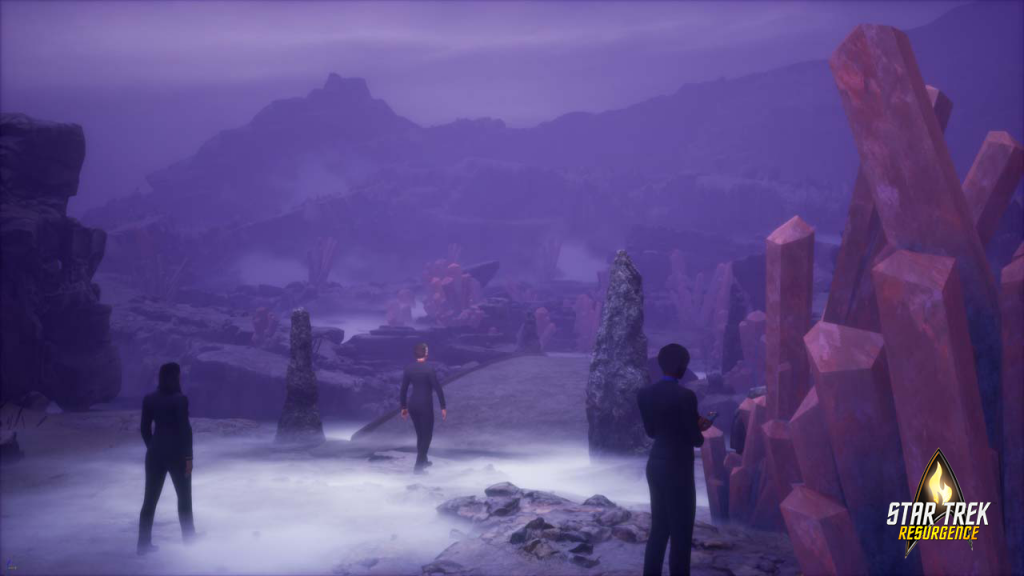
One thing that nagged at me early in Resurgence was its attempts to pull at Trek fans’ senses of nostalgia. I audibly gasped at the appearance of a certain NPC, and then rolled my eyes a bit when another showed up later; I get that there are fans out there who likely would go crazy for these cameos, but I found them slightly odd, as if tying the game to established points of fandom love in order to garner player sympathy or affection to some of the rougher parts of the game. Alternatively, it smacks a little of seeming like the game was afraid to portray a version of Star Trek that did not name drop (or literally person drop) established, beloved characters instead of establishing it’s own identity. And, certainly, Star Trek is generally interconnected; lots of memorable episodes of TNG or Deep Space 9 feature cameos and callbacks, as do more modern shows and movies, but at times I found these a little hamfisted into the game itself. They aren’t harmful, nor do these characters detract from the narrative save for one, who it feels like disappointing means you’re playing the game wrong.
This nostalgic worship also rears its head in the way that the game seems beholden to the legacy of games like The Walking Dead from the defunct Telltale, which tracks, as quite a few of the Dramatic Labs developers worked for Telltale. The problem is that the weakest portions of this game remind me of why I found Telltale games stale after a while: choices sometimes don’t make clear sense or feel forced on the player, “gameplay” or action sequences detract from the most compelling aspects of the game, and some of the narrative choices smack of being stuck in the past. The most irritating one stems from a somewhat forced romantic relationship that happens in Diaz’s route almost immediately upon starting his storyline. While you can try to choose to avoid the relationship, doing so just implies that it DID happen or something COULD have happened, and so your choice as a player is to lean into the hetero relationship that feels, well, totally empty, or try to lean away from it, and have the game kind of force it on you anyway.
Alternatively, Rydek’s storyline has no direct romantic implications, except for one NPC relationship that reads so sapphicly charged that it has to be accidental queerbaiting where the writers just did not realizing what they had going here: Rydek and this character go through all of the emotional moments one might expect from a romantic, or especially lesbian, romance to develop: trials by fire, learning to trust, saving one another, and even has a moment of dramatic antigravity twirling as one character holds onto the other. To have no ability to make this pay off romantically in any way; Listen, I’m kind of an expert on lesbian romance, and I can tell something was cooking here, but don’t offer to serve me something and then change the menu. Having to trudge through the game forcing Diaz’s hetero romantic implications is a little annoying, but maybe I’m holding out some hope Dramatic Labs will consider more queer options in the future, or have a writing room that isn’t entirely male, either one sounds great.
Time’s Orphan
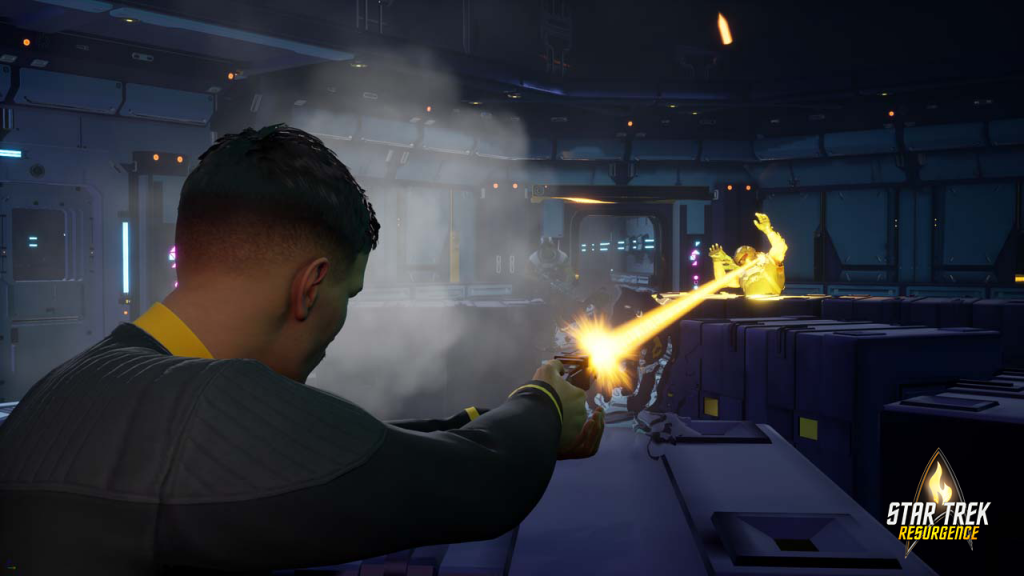
This narrative grousing aside, despite the somewhat dated nature of the game’s story and gameplay, there is a lot to enjoy in Resurgence. I found myself drawn into the narrative to the point that I ended up staying up until nearly 4 am to see the game completed, and I haven’t done that in quite some time. I reached out to Dramatic Labs to confirm a few things, and depending on your choices, there are numerous endings and outcomes that can be achieved; some seem obvious, but others aren’t, and I’m curious to work my way through the game a second time to see what different ending outcomes I can get for certain characters. Resurgence really does a great job of nailing some of that diplomatic and dramatic tension that Star Trek excels at: problems can’t be solved entirely with phasers and photo torpedoes, but choices, and that those choices will have consequences.
Diaz’s storyline feels like an homage to more modern Star Trek, with a focus on the lower deck crew and their struggles to be seen as individuals in a larger system; in many ways, the Diaz storyline explores the weaknesses of the Federation, but without a lot of the cynicism that some modern attempts at updating Star Trek have done so. The Federation is still considered a force of good and peace in the universe, and the narrative doesn’t try to undermine that consideration, but instead simply note that there are ways in which the Federation is not perfect and that many problems can’t be solved entirely by stiff protocol. Rydek’s narrative is the much more sophist view of Star Trek, the types of episodes Next Generation fans rant about with epic speeches on what it means to be alive or the place of life in a cold universe. Personally, I found Rydek to be the far more interesting character to play as and engage with, but appreciated both stories as it provided an interesting A and B storyline sequence that felt very Trek.
Perhaps the greatest compliment to be paid to Resurgence is that it does get ‘Trek’. The chapters have episode titles like episodes of the show, the aesthetic is right, and Dramatic Labs never goes too far into changing up Trek lore or ideas to suit their own narrative. This does at times mean that some story beats or choices seem to have obvious correct (Prime Directive-inspired choices) and incorrect (going super rogue) options, but honestly? I liked that. I liked that the game knew the universe to a point that it presented choices like this as a chance to go off script, but then veer slightly into What If? territory than trying to make Star Trek bend to my whims as a player. And the story is generally quite engaging; I found myself engrossed in wanting to know what would happen next, and thoroughly enjoyed the moments when the game made me feel like I was finally playing in the space of one of my favorite franchises rather than playing a corridor shooter or space shooter game with Star Trek slapped onto the box.
Take Me Out to the Holosuite
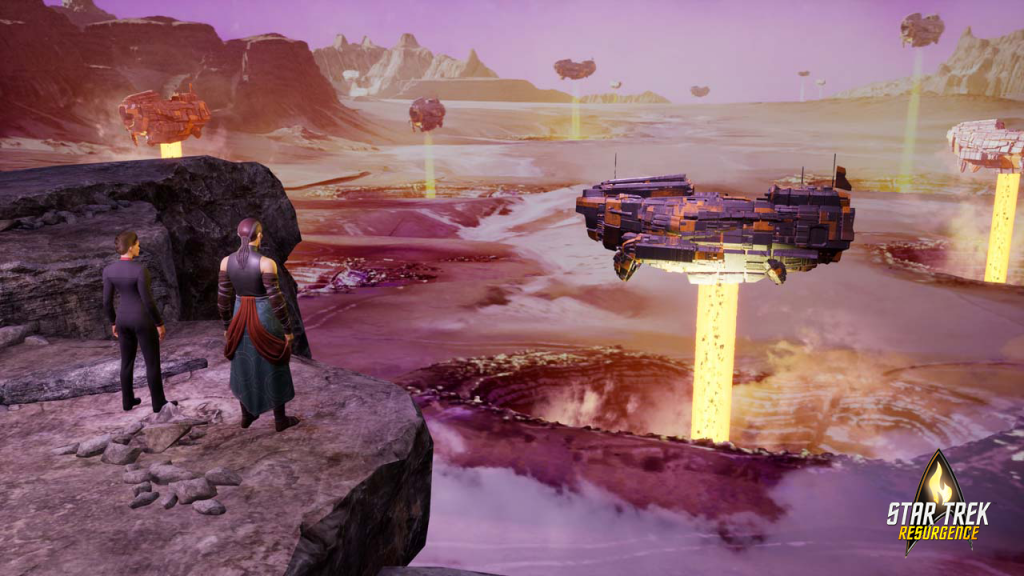
Star Trek Resurgence is a great return to the universe of Star Trek that I and likely many others fell in love with as children or adults: the almost high fantasy style scifi universe in which it seemed like everything was possible, a universe that prided logic, debate, and conflict resolution above action and magical solutions. Perhaps the biggest issue the game has, however, is that it does very little to convince new people to give the game a chance. Knowing nothing about Star Trek would likely make this game difficult or even silly, and certainly does nothing to combat any of the stereotypes Star Trek might have. There isn’t even a lot for me to say to convince non-Trek fans to play the game, sadly – if you don’t like Star Trek, you probably aren’t going to like Resurgence.
Star Trek Resurgence is a great return to the universe of Star Trek that I and likely many others fell in love with as children or adults
But if you do like Star Trek, particularly the period of the 90s in which Star Trek dominated much of the sci-fi television landscape between Next Generation, Deep Space Nine, and Voyager, than Star Trek Resurgence will likely feel extremely comforting and fun to engage with. The story is entertaining and gripping enough to encourage you to see it through, the characters interact in interesting ways, and Jara Rydek feels like a character you’ve somehow known for years despite being essentially created from scratch just for this video game. It would be great to see more adventures featuring Jara and the crew of the Resolute in the future.
Although next time, let us actually have our lesbian romance. Trust me: It’ll sell.
Have any questions or feedback? Drop us a note in the comments below or email us at contact@goonhammer.com.
